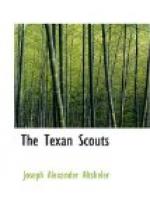Santa Anna laughed.
“Let him have his way for the present, Captain Urrea,” he said. “But remember that it is due to your gentleness and mercy. Adios, Senor Fulton, we meet again to-morrow morning, and if you survive I shall report to Mr. Roylston the manner in which you may bear yourself.”
“Good-day,” said Ned, resolved not to be outdone, even in ironical courtesy. “And now, Captain Urrea, if you will lead the way, I’ll follow.”
Urrea and his soldiers took Ned from the Veramendi house and across the street to a large and strong stone building.
“You are fortunate,” said Urrea, “to have escaped immediate death. I do not know why the name of Roylston was so powerful with our general, but I saw that it was.”
“It seemed to have its effect,” said Ned.
Urrea led the way to the flat roof of the house, a space reached by a single narrow stairway.
“I shall leave you here with two guards,” he said. “I shall give them instructions to fire upon you at the slightest attempt on your part to escape, but I fancy that you will have sense enough not to make any such attempt.”
Urrea departed, but the two sentinels sat by the entrance to the stairway, musket in hand. He had not the faintest chance to get by them, and knowing it he sat down on the low stone coping of the roof. He wondered why Urrea had brought him there instead of locking him up in a room. Perhaps it was to mock him with the sight of freedom so near and yet unattainable.
His gaze turned instinctively to the Alamo like the magnet to the pole. There was the fortress, gray and grim in the sunshine, with the dim figures of the watchers on the walls. What were they doing inside now? How were Crockett and Bowie? His heart filled with grief that he had failed them. But had he failed them? Neither Urrea nor any other Mexican had spoken of the approach of a relieving force under Roylston. There was no sign that the Mexicans were sending any part of their army to meet it.
The heavy thud of a great gun drew his attention, and he saw the black smoke from the discharge rising over the plain. A second, a third and a fourth cannon shot were fired, but no answer came from the walls of the Alamo. At length he saw one of the men in the nearest battery to the Alamo expose himself above the earthwork. There was a flash from the wall of the church, a little puff of smoke, and Ned saw the man fall as only dead men fall. Perhaps it was Davy Crockett, the great marksman, who had fired that shot. He liked to think that it was so, and he rejoiced also at this certain evidence that the little garrison was as dauntless as ever. He watched the Alamo for nearly an hour, and he saw that the firing was desultory. Not more than a dozen cannon shots were fired during that time, and only three or four rifles replied from the Alamo. Toward noon the firing ceased entirely, and Ned knew that this was in very fact and truth the lull before the storm.




